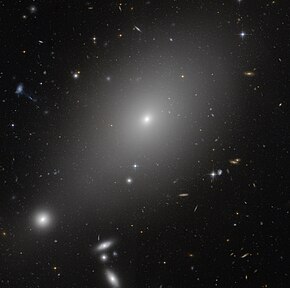| ESO 306-17 | |
|---|---|
 Image of ESO 306-17 by the
Hubble Space Telescope Release date: 4 March 2010 | |
| Observation data ( J2000.0 epoch) | |
| Constellation | Columba |
| Right ascension | 05h 40m 06.73s [1] |
| Declination | −40° 50′ 10.6″ [1] |
| Redshift | 0.035805±0.000083 [2] |
| Heliocentric radial velocity | 10,734±25 km/s [2] |
| Galactocentric velocity | 10,544±26 km/s [2] |
| Distance | 517.3 ± 36.20
Mly (158.6 ± 11.1
Mpc)h−1 0.6774 (Comoving) [2] 506 Mly (155.1 Mpc)h−1 0.6774 ( Light-travel) |
| Apparent magnitude (B) | 13.36 [1] |
| Characteristics | |
| Type | E+3 [2] |
| Size | 1,070,000
ly × 706,100 ly (328.04 kpc × 216.50 kpc) ( diameter; 90% total B-band light) [2] [a] 399,300 ly × 287,500 ly (122.42 kpc × 88.15 kpc) ( diameter; "total" magnitude) [2] [a] |
| Apparent size (V) | 2.5 ′ × 1.5 ′ ( V-band) [2] |
| Other designations | |
| MCG -07-12-009, PGC 17570 [3] | |
ESO 306-17 is a fossil group giant elliptical galaxy in the Columba constellation, about 1.07 million light-years in diameter, [2] [4] and roughly 517 million light-years away. [2]
The galaxy is situated alone in a volume of space about it. It is theorized that the galaxy cannibalized its nearest companions, hence, being a fossil group. [5] The galaxy is a giant elliptical of type cD3 [2] (E+3), one of the largest types of galaxies.
Notes
References
- ^ a b c "Search specification: ESO 306-17". HyperLeda. Université Claude Bernard Lyon 1. Retrieved 2021-02-13.
- ^ a b c d e f g h i j k "Results for object NGC ESO 306-17 (ESO 306-17)". NASA/IPAC Extragalactic Database. California Institute of Technology. Retrieved 2021-02-13.
- ^ "ESO 306-17". SIMBAD. Centre de données astronomiques de Strasbourg. Retrieved 2021-02-13.
- ^ MSNBC, "A Giant Among Galaxies ?", Alan Boyle, 4 March 2010 (accessed 5 March 2010)
- ^ Astronomy Now, "Bully galaxy rules the neighbourhood", Emily Baldwin, 4 March 2010 (accessed 5 March 2010)
External links
- Discovery News, "Bully for ESO 306-17", Jennifer Ouellette, 3 March 2010 (accessed 5 March 2010)
- EurekAlert, "ACS Image of ESO 306-17" Archived 2010-05-16 at the Wayback Machine, Colleen Sharkey, 4 March 2010 (accessed 5 March 2010)
| ESO 306-17 | |
|---|---|
 Image of ESO 306-17 by the
Hubble Space Telescope Release date: 4 March 2010 | |
| Observation data ( J2000.0 epoch) | |
| Constellation | Columba |
| Right ascension | 05h 40m 06.73s [1] |
| Declination | −40° 50′ 10.6″ [1] |
| Redshift | 0.035805±0.000083 [2] |
| Heliocentric radial velocity | 10,734±25 km/s [2] |
| Galactocentric velocity | 10,544±26 km/s [2] |
| Distance | 517.3 ± 36.20
Mly (158.6 ± 11.1
Mpc)h−1 0.6774 (Comoving) [2] 506 Mly (155.1 Mpc)h−1 0.6774 ( Light-travel) |
| Apparent magnitude (B) | 13.36 [1] |
| Characteristics | |
| Type | E+3 [2] |
| Size | 1,070,000
ly × 706,100 ly (328.04 kpc × 216.50 kpc) ( diameter; 90% total B-band light) [2] [a] 399,300 ly × 287,500 ly (122.42 kpc × 88.15 kpc) ( diameter; "total" magnitude) [2] [a] |
| Apparent size (V) | 2.5 ′ × 1.5 ′ ( V-band) [2] |
| Other designations | |
| MCG -07-12-009, PGC 17570 [3] | |
ESO 306-17 is a fossil group giant elliptical galaxy in the Columba constellation, about 1.07 million light-years in diameter, [2] [4] and roughly 517 million light-years away. [2]
The galaxy is situated alone in a volume of space about it. It is theorized that the galaxy cannibalized its nearest companions, hence, being a fossil group. [5] The galaxy is a giant elliptical of type cD3 [2] (E+3), one of the largest types of galaxies.
Notes
References
- ^ a b c "Search specification: ESO 306-17". HyperLeda. Université Claude Bernard Lyon 1. Retrieved 2021-02-13.
- ^ a b c d e f g h i j k "Results for object NGC ESO 306-17 (ESO 306-17)". NASA/IPAC Extragalactic Database. California Institute of Technology. Retrieved 2021-02-13.
- ^ "ESO 306-17". SIMBAD. Centre de données astronomiques de Strasbourg. Retrieved 2021-02-13.
- ^ MSNBC, "A Giant Among Galaxies ?", Alan Boyle, 4 March 2010 (accessed 5 March 2010)
- ^ Astronomy Now, "Bully galaxy rules the neighbourhood", Emily Baldwin, 4 March 2010 (accessed 5 March 2010)
External links
- Discovery News, "Bully for ESO 306-17", Jennifer Ouellette, 3 March 2010 (accessed 5 March 2010)
- EurekAlert, "ACS Image of ESO 306-17" Archived 2010-05-16 at the Wayback Machine, Colleen Sharkey, 4 March 2010 (accessed 5 March 2010)